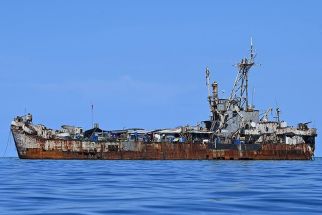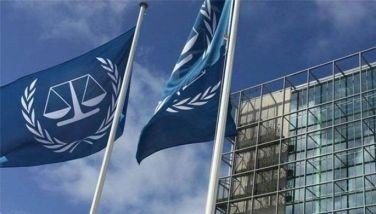AFP: P1 B vs NPA not murder fund
June 22, 2006 | 12:00am
The Armed Forces of the Philippines (AFP) maintained yesterday that the P1-billion outlay by President Arroyo for the military to crush the communists was not a "murder fund" to finance the killing of rebels and their sympathizers.
Armed Forces chief Gen. Generoso Senga said allegations that the military had been given the fund to murder communist guerrillas and members of leftist groups were unfair.
"It’s not fair to say this is a murder fund because the AFP will conduct its operations together with the PNP (Philippine National Police) in accordance with our existing laws," Senga told reporters at Malacañang.
"We are doing the counterinsurgency operation so that we can accelerate the socio-economic development of the country. We should all cooperate to achieve this," he said.
At the same news conference, Press Secretary Ignacio Bunye said the offensive against the communists is not a "campaign of force and violence but a combination of security operations directed at armed adversaries, development directed at poor communities and governance initiatives directed at the local governments."
Bunye and Executive Secretary Eduardo Ermita said offensives will also target sympathizers and financiers of the Communist Party of the Philippines (CPP) to choke the flow of funds to New People’s Army (NPA) insurgents and reduce their mass base in the countryside.
"Definitely anyone who abets insurgency, who gives comfort to the enemy would be within the ambit of counterinsurgency operations because insurgents in another lingo are guerrillas for all intents and purposes, (who) live off the land and depend on the assistance provided to them by their cadres on the ground," Ermita said.
He said business firms that continue to pay "revolutionary taxes" to the NPA will also be investigated and prosecuted.
Ermita claimed security forces have a list of business firms suspected of "comforting the enemy" in giving financial support and refuge to the NPA rebels.
Business firms that are being squeezed by the NPA can seek protection from the government, Ermita said.
"We are allocating so much funding to neutralize those who are creating trouble for government which affects our economy, and then they (sympathizers) are helping the other side so they should be careful because they should not be helping the enemies of government," Ermita said.
Senga, for his part, said the AFP has modified its plan against the NPA to put to good use the additional P1 billion funding from the President.
"We are confident that given the assistance and the support of the other agencies of the government and even the support of our general population, we can accomplish the mission after all. Anyway, this is for all of us," Senga said.
Senga said the AFP wants to resolve the insurgency problem as soon as possible to enable the countryside to develop.
He said the list of additional equipment to be purchased with the P400-million allocation for the AFP is currently being prepared.
Other sectors, however, called on Malacañang not to shelve non-military solutions to the insurgency problem.
Former President Joseph Estrada, who himself waged a total war against the Moro Islamic Liberation Front (MILF) during his aborted term, has expressed opposition to President Arroyo’s declaration of an offensive against the NPA.
Estrada said it was untimely for the government to be prioritizing its offensive against the NPA. He said the government should instead focus its resources on solving the problem of poverty.
He said if he were still president, he would have instead encouraged the communists to enter into negotiations.
"I would first talk with them and ask them how can we negotiate with them, I can tell (them) it is about time we get together for the sake of the future of our country and our people," he said.
Davao City Rep. Prospero Nograles also urged both the government and the CPP-NPA to resume their exploratory talks that have been stalled since 2004.
The CPP-NPA withdrew from the talks after the United States and the European Union tagged them as "foreign terror organizations."
"The people and the country stand to benefit from a peace deal resulting from their negotiations," Nograles said.
He also proposed the government should create an inter-agency task force to monitor the collateral damage from the offensives against the rebels.
He said the government should always aim for zero civilian casualties even though there was no guarantee of success.
Nograles, however, expressed disappointment over the hard-line stance of CPP founder Jose Ma. Sison for his refusal to talk peace with the government.
Malabon-Navotas Rep. Federico Sandoval II, for his part, urged the Catholic Bishops Conference of the Philippines (CBCP) to help persuade the communists to return to the negotiating table.
Sandoval noted the CBCP had criticized the war chest funding by saying the government should instead address the "root causes" of insurgency.
"It was unfair for the CBCP to prejudge the government’s anti-insurgency campaign without offering a viable solution to the insurgency problem, or without any similar condemnation of the NPA," Sandoval said.
He said the government should not be blamed for the failure of the peace talks.
All efforts to attain peace have been exerted but that the CPP-NPA "unilaterally cut the negotiation avenues," Sandoval said.
Instead of resuming negotiations, Sandoval said, the communists chose to ride on the baseless charges against Mrs. Arroyo and sided with anti-Arroyo forces because they thought it would serve their interests. "That’s classic opportunism for you," he said.
Bunye added the negotiating table had always remained open but the CPP showed no interest in coming back.
He said the communist leaders instead foisted an absurd precondition of lifting the terror tag placed on them by the US and the European Union, a decision over which the Philippine government has no control.
Opposition Sen. Juan Ponce Enrile also advised the Catholic bishops to either convince the rebels to put down their arms or simply shut up.
Enrile pointed out the peace negotiations initiated by the government with the communists over the years have not resulted in peace.
"We’ve been negotiating with them for so long. They have not surrendered their arms in spite of the government’s efforts to negotiate. Negotiations are always open even if we are shooting at each other," Enrile said.
The former defense minister emphasized the military and police must enforce the laws and maintain stability in the country.
Enrile stressed part of law enforcement is to go after insurgents.
"Now those who would want to maintain the peace, let them go out and let them convince both sides especially those who are challenging the government to become peaceful. If they cannot convince them, by all means shut up," Enrile said.
He said the P1-billion fund for the military is just a small amount to start the operations against insurgency and more funding is needed to accomplish the mission. - With Paolo Romero, Mike Frialde, Marvin Sy, Delon Porcalla, Jaime Laude, Joseph Garcia
Armed Forces chief Gen. Generoso Senga said allegations that the military had been given the fund to murder communist guerrillas and members of leftist groups were unfair.
"It’s not fair to say this is a murder fund because the AFP will conduct its operations together with the PNP (Philippine National Police) in accordance with our existing laws," Senga told reporters at Malacañang.
"We are doing the counterinsurgency operation so that we can accelerate the socio-economic development of the country. We should all cooperate to achieve this," he said.
At the same news conference, Press Secretary Ignacio Bunye said the offensive against the communists is not a "campaign of force and violence but a combination of security operations directed at armed adversaries, development directed at poor communities and governance initiatives directed at the local governments."
Bunye and Executive Secretary Eduardo Ermita said offensives will also target sympathizers and financiers of the Communist Party of the Philippines (CPP) to choke the flow of funds to New People’s Army (NPA) insurgents and reduce their mass base in the countryside.
"Definitely anyone who abets insurgency, who gives comfort to the enemy would be within the ambit of counterinsurgency operations because insurgents in another lingo are guerrillas for all intents and purposes, (who) live off the land and depend on the assistance provided to them by their cadres on the ground," Ermita said.
He said business firms that continue to pay "revolutionary taxes" to the NPA will also be investigated and prosecuted.
Ermita claimed security forces have a list of business firms suspected of "comforting the enemy" in giving financial support and refuge to the NPA rebels.
Business firms that are being squeezed by the NPA can seek protection from the government, Ermita said.
"We are allocating so much funding to neutralize those who are creating trouble for government which affects our economy, and then they (sympathizers) are helping the other side so they should be careful because they should not be helping the enemies of government," Ermita said.
Senga, for his part, said the AFP has modified its plan against the NPA to put to good use the additional P1 billion funding from the President.
"We are confident that given the assistance and the support of the other agencies of the government and even the support of our general population, we can accomplish the mission after all. Anyway, this is for all of us," Senga said.
Senga said the AFP wants to resolve the insurgency problem as soon as possible to enable the countryside to develop.
He said the list of additional equipment to be purchased with the P400-million allocation for the AFP is currently being prepared.
Former President Joseph Estrada, who himself waged a total war against the Moro Islamic Liberation Front (MILF) during his aborted term, has expressed opposition to President Arroyo’s declaration of an offensive against the NPA.
Estrada said it was untimely for the government to be prioritizing its offensive against the NPA. He said the government should instead focus its resources on solving the problem of poverty.
He said if he were still president, he would have instead encouraged the communists to enter into negotiations.
"I would first talk with them and ask them how can we negotiate with them, I can tell (them) it is about time we get together for the sake of the future of our country and our people," he said.
Davao City Rep. Prospero Nograles also urged both the government and the CPP-NPA to resume their exploratory talks that have been stalled since 2004.
The CPP-NPA withdrew from the talks after the United States and the European Union tagged them as "foreign terror organizations."
"The people and the country stand to benefit from a peace deal resulting from their negotiations," Nograles said.
He also proposed the government should create an inter-agency task force to monitor the collateral damage from the offensives against the rebels.
He said the government should always aim for zero civilian casualties even though there was no guarantee of success.
Nograles, however, expressed disappointment over the hard-line stance of CPP founder Jose Ma. Sison for his refusal to talk peace with the government.
Malabon-Navotas Rep. Federico Sandoval II, for his part, urged the Catholic Bishops Conference of the Philippines (CBCP) to help persuade the communists to return to the negotiating table.
Sandoval noted the CBCP had criticized the war chest funding by saying the government should instead address the "root causes" of insurgency.
"It was unfair for the CBCP to prejudge the government’s anti-insurgency campaign without offering a viable solution to the insurgency problem, or without any similar condemnation of the NPA," Sandoval said.
He said the government should not be blamed for the failure of the peace talks.
All efforts to attain peace have been exerted but that the CPP-NPA "unilaterally cut the negotiation avenues," Sandoval said.
Instead of resuming negotiations, Sandoval said, the communists chose to ride on the baseless charges against Mrs. Arroyo and sided with anti-Arroyo forces because they thought it would serve their interests. "That’s classic opportunism for you," he said.
Bunye added the negotiating table had always remained open but the CPP showed no interest in coming back.
He said the communist leaders instead foisted an absurd precondition of lifting the terror tag placed on them by the US and the European Union, a decision over which the Philippine government has no control.
Opposition Sen. Juan Ponce Enrile also advised the Catholic bishops to either convince the rebels to put down their arms or simply shut up.
Enrile pointed out the peace negotiations initiated by the government with the communists over the years have not resulted in peace.
"We’ve been negotiating with them for so long. They have not surrendered their arms in spite of the government’s efforts to negotiate. Negotiations are always open even if we are shooting at each other," Enrile said.
The former defense minister emphasized the military and police must enforce the laws and maintain stability in the country.
Enrile stressed part of law enforcement is to go after insurgents.
"Now those who would want to maintain the peace, let them go out and let them convince both sides especially those who are challenging the government to become peaceful. If they cannot convince them, by all means shut up," Enrile said.
He said the P1-billion fund for the military is just a small amount to start the operations against insurgency and more funding is needed to accomplish the mission. - With Paolo Romero, Mike Frialde, Marvin Sy, Delon Porcalla, Jaime Laude, Joseph Garcia
BrandSpace Articles
<
>
- Latest
- Trending
Trending
Latest
Trending
Latest
Recommended
January 25, 2025 - 12:00am



























